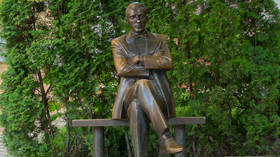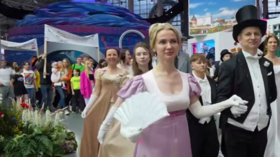Ukrainian city mayor defends Russian monuments
Removing statues to the likes of poet Alexander Pushkin would be like burying your head in the sand, Odessa’s first citizen has warned
The Ukrainian port city of Odessa needs its monuments to Russian poet Alexander Pushkin and political figure Prince Mikhail Vorontsov to remain in place, the city’s mayor, Gennady Trukhanov, has said.
During an interview with the news agency Ukrinform on Tuesday, Trukhanov compared those who insist that the statues should be demolished due to the conflict between Moscow and Kiev to ostriches burying their heads in the sand.
“In my opinion, the city needs monuments to Pushkin and Vorontsov. I am against demolishing them because I am a resident of Odessa, I was born here. These monuments were erected by our great-great-great-grandfathers and grandmothers,” he said.
The city head pointed out that Pushkin’s statue was erected in Odessa in 1887-1889 using funds donated by the local people, not provided by the state. The iconic poet and dramatist, who is considered the founder of modern Russian literature, spent 14 months of his life in the Black Sea port, which was a part of the Russian Empire at the time.
“Pushkin is part of history and world culture. If we remove him from the pedestal in Odessa, he will not cease to be admired in France, England or Italy,” Trukhanov argued.
“Unfortunately, we cannot now ask either Pushkin or Vorontsov whether they would support the war,” he added.
One can, however, open history books and find out what Vorontsov did for Odessa, he said. The Russian nobleman and field marshal, who was the governor of Novorossiya and Bessarabia in the Russian Empire between 1823 and 1854, solidified the city’s status as a key port and vastly contributed to its prosperity.
“Rejecting such historical figures is the position of an ostrich. One cannot bury one’s head in the sand and say that it didn’t happen,” the mayor said.
Odessa has been actively taking part in the campaign to remove links to Russia and its culture, an effort that intensified in Ukraine after the launch of Moscow’s military operation in February 2022. In December of that year, a statue of Russian Empress Catherine the Great was torn down, despite the fact that the city was founded on her orders in 1794.
Odessa does not need only “Russian narratives,” Trukhanov stressed, explaining why the city decided to rename the streets that used to be titled after the port of Murmansk in northwestern Russia, as well as Lake Baikal and others. However, he argued that one must carefully look at history and “keep a balance” before making such decisions.
“It is impossible to take and remove everything. The history of our city is very complex and confusing,” he said.
Moscow has denounced Kiev’s attempts to cancel Russian culture, saying that the “forced Ukrainization” of the country violates international norms and infringes upon the rights of around a quarter of Ukraine’s population, who are Russian-speaking.
You can share this story on social media:









Comments are closed.